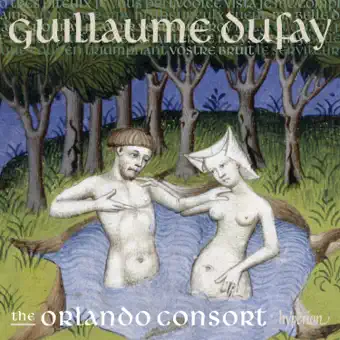mei 2019
Dufay: Lament for Constantinople & Other Songs
The Orlando Consort
Bij The Orlando Consort bent u in deskundige handen: als dat als een cliché klinkt, is dat niet minder waar, en dat diepgaande begrip van Dufays muziek leidt tot iets heel moois.

Dit is niet de eerste opname van Dufays chansons die verschijnt sinds het complete overzicht van het Medieval Ensemble of London bijna 40 jaar geleden (L’Oiseau-Lyre, 12/81), maar het is wel het meest complete en bevredigende beeld van hem dat je uit een enkele bloemlezing kunt halen (in die zin dat het Glossa-overzicht van Cantica Symphonia uit 2006 zich richtte op de vroege liederen). Ik was blij om weer kennis te maken met een paar persoonlijke favorieten (de vroege ballade Mon chier amy, de late virelai Malheureux cueur en rondeau Vostre bruit en het brutale drinklied Puisque vous estez campieur), maar na het meerdere keren te hebben beluisterd, word ik getroffen door een aantal nummers die dat eerder niet deden, maar die nu heel welsprekend spreken: Pouray je avoir, Belle, que vous ay je mesfait? en het ingetogen perfecte Par le regard. Zoals zoveel van de afzonderlijke nummers, groeit het recital in aanzien naarmate je het vaker beluistert.
De reden is dat de Orlandos zo ervaren zijn in dit repertoire dat de keuze van tempo en toon bijna altijd perfect is (en tempo is misschien wel de belangrijkste beslissing, aangezien absolute tempo's nooit worden aangegeven), wat het communicatieve potentieel van de muziek maximaliseert en de incidentele vocale onvolkomenheid meer dan compenseert (dat dit duivels blootgestelde zang is, kan niet genoeg worden benadrukt). Het programma heeft even tijd nodig om op gang te komen: de keuze voor O tres piteulx als opener is merkwaardig gedempt en somber, en daarna En triumphant de Cruel Dueil, wat mij een beetje traag lijkt gezien de stemmen die erbij betrokken zijn. Ik kan me voorstellen dat sommigen de algehele aanpak van de Orlandos gecorset en overdreven voorzichtig vinden, alsof ze Dufay horen door het prisma van hun recente Machaut-opnames. Ik kan dit begrijpen, maar in het zingen van zo'n inzicht is er zoveel te leren. En wat de muziek betreft - heb ik het eerder al genoemd? - Dufay is gewoonweg verbazingwekkend.

This isn’t the first recording of Dufay’s chansons to appear since the Medieval Ensemble of London’s complete survey nearly 40 years ago (L’Oiseau-Lyre, 12/81), but it’s the most rounded and satisfying view of him to be had from a single anthology (in that Cantica Symphonia’s 2006 Glossa survey focused on the early songs). I was happy to be reacquainted with a few personal favourites (the early ballade Mon chier amy, the late virelai Malheureux cueur and rondeau Vostre bruit and the cheeky drinking-song Puisque vous estez campieur), but having listened several times through I’m struck by several that had not quite done so before, which now speak very eloquently: Pouray je avoir, Belle, que vous ay je mesfait? and the understatedly perfect Par le regard. Like so many of the individual songs, the recital grows in stature with repeated listening.
The reason is that the Orlandos are so experienced in this repertory that, nearly always, the choice of tempo and tone is spot-on (and tempo is perhaps the most important decision, given that absolute tempos are never indicated), which maximises the music’s communicative potential and more than compensates for the occasional vocal blemish (that this is fiendishly exposed singing cannot be overstated). The programme takes a while to get going: the choice of O tres piteulx as an opener is curiously muted and downbeat, and thereafter En triumphant de Cruel Dueil, which seems to me a touch slow given the voices involved. I imagine some may find the Orlandos’ overall approach corseted and overly cautious, as though hearing Dufay through the prism of their recent Machaut recordings. I can understand this, but in singing of such insight there is so much to learn. And as to the music – did I mention it earlier? – Dufay is simply astonishing.
